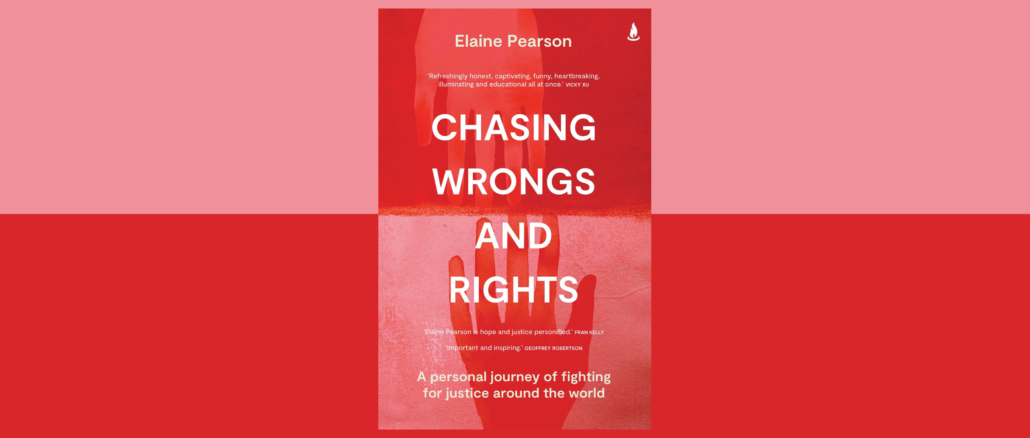
When Romanian American Holocaust survivor, the eternally brave and defiant Elie Wiesel, spoke of the Holocaust, he reminded the world that “For the dead and the living we must bear witness”. Elie additionally stated, of all injustices throughout the world, that “We must always take sides. Neutrality helps the oppressor, never the victim. Silence encourages the tormentor, never the tormented”.
Elie’s stoically wise and poignant words have lit a light in the hearts of people throughout the subsequent generations worldwide. Such a person who earnestly exemplifies and lives day-to-day Elie’s directives for humankind is Australian author and Australia Director for Human Rights Watch, Elaine Pearson. Her recently released memoir, “Chasing Wrongs and Rights” is an intricately detailed and factual account of verifiably devastating human injustices throughout the world (including by the Australian government and in Australia) that Elaine has been involved in researching, documenting and bringing to the world’s attention through a variety of high-powered positions Elaine has held, in the turbulently dark, yet ultimately vehemently rewarding sphere of human rights.
Trained as a lawyer, Elaine was ‘taught’ by society early on in her life, in the Australia of the 1970s and 1980s, that she was ‘different’. Having a British father (who was white) and a Chinese mother (being from Singapore), Elaine, as a person of mixed-race tried desperately to fit in to a largely white Australia. Racism was, however, simmering cruelly in the strata of Australian life. Elaine would be told as a child to “go home, nip” and “Your mum is a mail order bride”.
Fortuitously, at high school in Perth, Elaine’s social sense of activism was ignited when she read “A Secret Country” by John Pilger (the book details the unfathomably hostile massacres of Indigenous Australians after the colonisation of the British in this complex land, as well as “the criminalisation of Aboriginal people that continues to this day”). Interestingly, the anti-Asian and unashamedly racist politician, Pauline Hanson, became a catalyst for Elaine taking a part in her very first protest, and propelling Elaine on her career trajectory of being a human rights activist. Pauline Hanson’s speech was caustically discriminatory and inaccurate. She (in)famously told Australians in 1996, “in her maiden speech to Parliament”, “I believe we are in danger of being swamped by Asians………They have their own culture and religion, form ghettos and do not assimilate”. Elaine had actually tried very hard to ‘fit in’.
Since 2007 Elaine has been an employee of Human Rights Watch, investigating, in addition to making public, human rights breaches worldwide.
From 2001 until 2004, Elaine lived in London, working methodically and diligently for Anti-Slavery International (prior to this Elaine lived in Bangkok, working for the Global Alliance Against Traffic in Women).
In 2004, Elaine was in Nepal, working for Oxfam. At this time in history, Nepal “had the highest number of enforced disappearances in the world”. The egregious and demonstrably murky practice of enforced disappearances takes place when people (mostly young men and women) are taken by authorities (who claim they have no knowledge of the practice and deny responsibility), the victims usually never being seen or heard from again.
Elaine attended a women’s rights protest in Nepal, as “from the streets of Perth to London, I had always loved a good protest”, but was inevitably (given the political and social climate of Nepal at the time) arrested by the police.
The trafficking of women, often to India, was occurring from Nepal. Many factors caused this flow of women. This included the civil war in Nepal.
In 2007, Elaine landed a highly prestigious, as well as far-reachingly demanding job in New York, a position as Asia Deputy Director of Human Rights Watch. Now, Human Rights Watch oversees more than 100 countries, whilst maintaining a staff of more then 550 people.
As Elaine describes Human Rights Watch as an organisation, “The objectives of the organisation are to investigate human rights abuses through our reporting, expose those abuses through publicity and ‘naming and shaming’ and try to change the situation through policy reform, and advocacy for justice and holding perpetrators of abuses to account”.
Sri Lanka, while Elaine was at the helm of Asia Human Rights Watch, was in the disastrous throes of civil war. The corrupt Sri Lankan government was fighting the Tamil Tigers. As Elaine tells us, “for the relatives of those who were killed or disappeared, our documentation work mattered”. Both the Tamil Tigers and the Sri Lankan government were guilty of violations of human rights. On the part of the Tamil Tigers, this included killing, capturing and torturing civilians. Some 500 disappearances, at this time, had been documented by human rights groups. The personal safety of journalists and organisations who documented disappearances was often in jeopardy.
The world didn’t take abundant notice of Sri Lankan problems at the time, yet Human Rights Watch continued to interview, document and expose war crimes and other atrocities in Sri Lanka to the world.
Elaine was further involved in investigating widespread corruption, killings and human rights abuses in the Philippines. Rodrigo Duterte was at one time the mayor of Davao City (the Philippines’ third largest city) and later became the president of the largely impoverished and decaying nation. While mayor, Duterte instigated and saw through mass killings of drug users, petty criminals and so forth. Human Rights Watch did a detailed report on the killings, ensuring the world now knew the deplorable lengths that Duterte and the Philippine government had gone to.
In recent years, Elaine has been the Human Rights Watch Australia Director. As part of this role, Elaine went to Manus Island to interview refugees who attempted to come to Australia by boat, but were instead subjected to years of barbaric limbo as successive Australian governments left them literally and physically rotting on Manus Island (as well as Nauru). Pleasingly, the following report by Human Rights Watch garnered both Australian and international news reports, and Elaine got to testify before an Australian senate inquiry. Joyfully, many of the asylum seekers got to resettle in countries like America and New Zealand.
Australian human rights infringements were further revealed to Elaine (and later us as readers) when she became aware of the unacceptable and soul-destroying state of Australian prisons, particularly the prisons’ inability to accommodate the needs of Indigenous prisoners, and Indigenous prisoners with a disability. Aboriginal people are vastly overrepresented in Australian prisons (for instance in Western Australia, Aboriginal people comprise just four percent of the population, yet make up thirty-nine percent of the prison population for adults). Elaine looked at the mental health of prisoners, noting an alarming rate of Aboriginal deaths-in-custody. As Elaine notes in her book, “governments need to address the over incarceration of Indigenous people, provide alternatives to incarceration, and ensure those who wind up in prison get culturally appropriate and adequate mental health support”.
Elaine also touches in the book on the fact that the Australian government sources an inordinate amount of revenue from Chinese students attending Australian universities (forty percent of international students at Australian universities are Chinese), and that this has led to the workings of universities being dampened down and muted (particularly in the area of freedom of speech, as the Chinese government does not tolerate well anyone being critical of them, even from afar on Australian university campuses). This is an ongoing concern for staff and students at Australian universities.
Elaine writes of Human Rights Watch, “Sometimes….we do achieve some of the enduring change that we always hope for. We may get a treaty, or a law passed that protects the rights of victims or funding to do the same, or see a human rights abuser charged for their crimes”.
Elaine has eloquently written a searingly intelligent, informative and educational book for the fragile and turbulent times we find ourselves in. Now that the world knows, through the findings of organisations such as Human Rights Watch, the work of human rights lawyers and the written and spoken word of international media, and accompanying photos and film footage, the plethora of human injustices and human suffering occurring minute by minute throughout the world, we cannot turn away.
Elaine notably informs us, “One of my objectives (in writing this book) was to remind readers that human rights violations are not just something that occur far away to ‘other’ people, but that they affect all of us, and we can all take small actions every day to improve human rights”.
Bravo Elaine for writing such a timely and enduringly significant book about how dark the human soul, psyche and condition, in committing undiluted atrocities, can actually be. Yet, we now know, that the same human species is still capable of phenomenal acts of kindness and graciousness.
I loved “Chasing Wrongs and Rights”. It is an important book for all in our society to read.


Leave a Reply